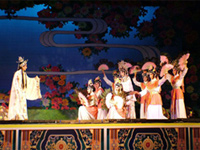About Foshan
Foshan is a prefecture-level city in central Guangdong province, China. In 2008, Foshan has jurisdiction over an area of about 3,848.49 km2 and a population of 5.86 million. The city' s GDP totaled RMB 433.3 billion, with a per capita GDP of RMB 70,806.
Foshan, founded in Jin Dynasty and named in Tang Dynasty, is the well-known historical and cultural city in China. Five thousand years ago, people began to create original civilization by means of fishing, farming and fabricating ceramics. In the second year of Zhenguan rein in Tang Dynasty (AD 628), three figures of Buddha were unearthed at Tapo Hillock in the city and a stone tablet inscribed with the name of "Foshan" ever since.
 Early in Tang Dynasty and Song Dynasty (more than 1000 years ago), Foshan was a prosperous place with developed handicraft industry, commerce and culture. In Ming Dynasty and Qing Dynasty, it developed into a prosperous town with swarms of merchants as well as developed industry and commerce. It was then honored as one of "Four Famous Towns" represented by Hankou Town in Hubei Province, Jingdezhen Town in Jiangxi Province and Zhuxianzhen Town in Henan Province. It was also regarded as one of "Four Distribution Centers" nationally together with Beijing, Suzhou and Hankou. Foshan has a long history of ceramic fabrication, and is crowned the name of "Capital of Ceramic in South China".
Early in Tang Dynasty and Song Dynasty (more than 1000 years ago), Foshan was a prosperous place with developed handicraft industry, commerce and culture. In Ming Dynasty and Qing Dynasty, it developed into a prosperous town with swarms of merchants as well as developed industry and commerce. It was then honored as one of "Four Famous Towns" represented by Hankou Town in Hubei Province, Jingdezhen Town in Jiangxi Province and Zhuxianzhen Town in Henan Province. It was also regarded as one of "Four Distribution Centers" nationally together with Beijing, Suzhou and Hankou. Foshan has a long history of ceramic fabrication, and is crowned the name of "Capital of Ceramic in South China".
 The centuries-old historical civilization of Foshan has nurtured unique traditional Lingnan Culture. Foshan is known as the cradle of folk arts in PRD as well as the birthplace of Canton Opera, the "Red Bean in South China" and the martial arts. It is the hometown of prominent figures of Kungfu, represented by Li Xiaolong (Bruce Lee) and Huang Feihong. Culture of ceramics, martial arts, flower, herbal medicine, canton opera and Qiuse (parade celebrating autumn harvest) of Foshan enjoy high reputation both at home and abroad.
The centuries-old historical civilization of Foshan has nurtured unique traditional Lingnan Culture. Foshan is known as the cradle of folk arts in PRD as well as the birthplace of Canton Opera, the "Red Bean in South China" and the martial arts. It is the hometown of prominent figures of Kungfu, represented by Li Xiaolong (Bruce Lee) and Huang Feihong. Culture of ceramics, martial arts, flower, herbal medicine, canton opera and Qiuse (parade celebrating autumn harvest) of Foshan enjoy high reputation both at home and abroad.
Now Foshan is the third largest city in Guangdong. The city is relatively affluent when compared to other Chinese cities, and it is home to many large private enterprises. Foshan recently has seen a transformation brought by China' s booming economy. Foshan is also famous for its numerous Wing Chun schools where many come to train and spar.

 Inquiry Basket (
Inquiry Basket (

